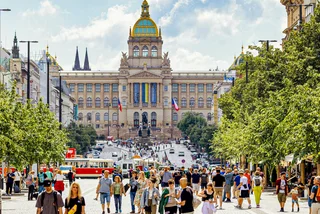A widescale study by multinational consulting firm Mercer has found that Prague is in the top 25 percent most expensive cities to live in globally, although – notably – it has dropped 23 spots in the 2024 Cost of Living City Ranking, meaning the Czech capital has become cheaper overall.
Mercer assessed 226 cities across five continents, analyzing the comparative costs of 200 items – ranging from housing and transportation to food, clothing, household goods, and entertainment. Czechia's decelerating inflation rate amid its gradual recovery from Covid-19 and skyrocketing energy prices in 2022 have helped contain consumer prices as per the study, although many aspects of Prague life have become costlier.
Food generally down, but drink up
Just looking at the prices of basic items shows how much certain goods have dipped in price in Czechia. For example, a 12-pack of eggs, according to price-comparison tool Numbeo and figures from the Czech Statistical Office, costs an average of CZK 60; a 24-percent decline from this time last year. Staples such as meat, flour, and fruit have also fallen in price.
Prague fares better in this regard in comparison to Warsaw, which saw a substantial increase in egg prices, and also in contrast to Madrid, which saw eggs climb by 12 percent.
Prices in Czechia: What’s changed?
- Apples, bananas (1kg) – CZK 37 (down by 6.7 percent year on year)
- Chicken fillets (1kg) – CZK 208 (down 5.8 percent)
- Cigarettes (20 pack), Malboro – CZK 150 (up 5 percent)
- Coffee (cappuccino) – CZK 65 (up 15 percent)
- Draft beer (12 degrees) in Prague, pint – CZK 75 (up 13 percent)
- Electricity (1 megawatt hour) – CZK 2,300 (down 32 percent)
- Rent (monthly; per square meter) – CZK 400 (up 7 percent)
- Water bills (per cubic meter) – CZK 145.7 (up 13 percent)
- Unleaded gasoline 95 Octane (1 liter) – CZK 39 (up 2.6 percent)
All data averages as of June 18, 2024, compared with year-earlier period
On the other hand, other items have shot up in price. Poor olive harvests earlier in the south of Europe have pushed up olive oil prices in Czechia significantly: Czech media outlet Seznam Zprávy reports that Albert supermarket sold 750 millimeters of extra virgin olive oil from Spain (Ondoliva) for CZK 286 in 2023, whereas this year the same bottle is around CZK 100 more expensive.
Governmental policy is partly behind the changes in consumer prices nationwide. As part of its major 2023 consolidation package, the state raised the value-added tax (VAT) rate for draft beer from 10 to 21 percent, but it reduced the VAT rate for food products, from 15 to 12 percent.
Sugary drinks are now also taxed at the highest rate of 21 percent, leading to a broad increase in alcoholic and non-alcoholic soft drinks.
PRAGUE VERSUS THE REST OF THE WORLD
- Eggs (12 pack, large) – Prague: CZK 60, London: CZK 92, New York: CZK 120, Berlin: CZK 80, Warsaw: CZK 69
- Gasoline (Unleaded 95 Octane, 1 liter) – Prague: CZK 39, London: CZK 44, New York: CZK 23, Berlin: CZK 44, Warsaw: CZK 38
- Men's jeans (Levis 501 brand or similar) – Prague: CZK 1,985, London CZK 2,439, New York: CZK 1,655, Berlin: CZK 2,093, Warsaw: CZK 2,072
- Cappuccino (regular) – Prague: CZK 72, London: CZK 106, New York: CZK 131, Berlin: CZK 92, Warsaw: CZK 81
Housing among the worst, but transport cheap
Housing is among the most expensive parts of life in Prague – a separate study found that people in the capital must earn around 15 gross annual average Czech salaries to purchase a 70-square-meter apartment in Prague – the highest rate in Europe. In 2023, rents rose by around 7 to 8 percent nationwide.
Public transport, on the other hand, is among the most affordable in Europe and has seen no change in price in recent years.
Pricier than other EU countries
Fuel prices have managed to stay pretty much constant since last year, but prices for clothing and footwear have leaped: a report earlier this year from Czech bank Česká spořitelna found that: “in terms of clothing and footwear prices, Czechia has overtaken the West…[prices] are at 112 percent of the EU level.”
On a European level, prices of groceries tend to be almost always cheaper in neighboring Poland, and are often cheaper in Germany (and sometimes Austria), leading to several people in border areas to do their weekly shopping in different countries. A recent report from Czech news outlet Novinky.cz found that a large tub of the Nutella chocolate spread was CZK 15 more expensive in Czechia, and – even worse – a 1-kilogram block of gouda cheese was CZK 50 pricier in the country.
Compared to Vienna, a three-course meal for two at a mid-range restaurant is as much as one-third cheaper in Prague. A pair of jeans and a monthly travel pass also cost much less; 18 percent and 38 percent cheaper, according to Numbeo. Salaries, however, are another topic altogether.












 Reading time: 3 minutes
Reading time: 3 minutes 
























